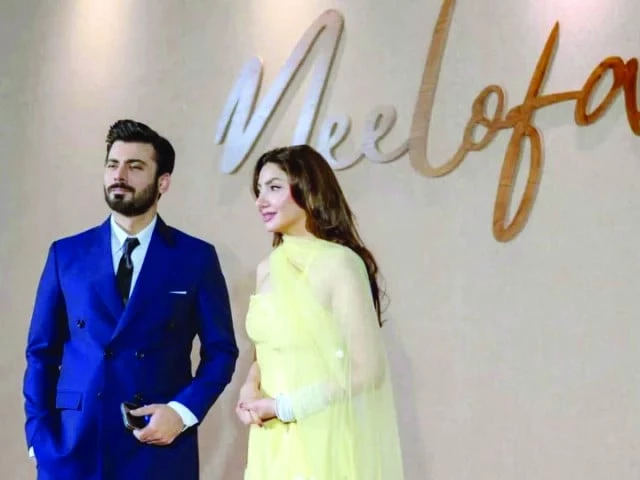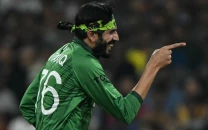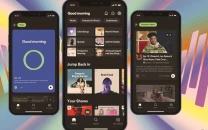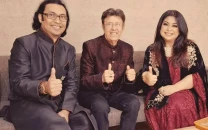Fawad Khan shrugs off 'Pakistan Idol' criticism
Actor's light-hearted remark rekindles nostalgia for his musical beginnings

Fawad Khan has finally broken his silence over the online criticism surrounding his appointment as a judge on the revived season of 'Pakistan Idol', a decision that has reignited debate over celebrity credibility and musical authenticity in the entertainment industry.
After nearly a decade off air, the singing competition's return was expected to generate nostalgia and excitement. Instead, it has sparked controversy — largely over its panel of judges, which features Rahat Fateh Ali Khan, Zeb Bangash, Bilal Maqsood, and Fawad Khan.
While the line-up was designed to blend pop, folk, and mainstream expertise, not everyone is convinced the selection reflects musical depth. The criticism, which began shortly after the show's launch, centred particularly on Fawad and Bilal.
Many social media users questioned whether the two men — both better known today for their non-musical projects — were the right fit to evaluate aspiring singers. Some argued that the younger generation is unfamiliar with their early musical work, while others defended the decision, calling it a reminder of Pakistan's rich pop-rock legacy.
Singer Humaira Arshad recently added her voice to the debate, suggesting that 'Pakistan Idol's producers had prioritised star power over musical authority. Without directly naming Fawad, she remarked that some of the judges "have no connection with music," implying that their presence owed more to fame than to technical competence.
"Judging musical talent requires years of training and a deep understanding of vocals and rhythm," she said in a television interview. "If someone knows they lack that knowledge, they should decline such roles instead of accepting them merely for fame or money."
Arshad added that while celebrities could make entertaining guest appearances, sitting in judgement over trained singers required command and credibility. "If a contestant were to ask some of these celebrity judges to perform a taan," she quipped, "they probably couldn't do it."
Her comments quickly circulated on social media, igniting a broader discussion about the purpose of television talent shows. For many critics, the controversy reflects a larger frustration — that reality TV has drifted away from its original goal of discovering genuine musical talent, becoming instead a stage for celebrity branding and sponsor visibility.
Still, Fawad Khan's supporters argue that his appointment is entirely justified. Before his rise as one of Pakistan's biggest film and drama stars, he was the lead vocalist of 'Entity Paradigm' (EP), a pioneering rock band that helped shape the sound of Pakistani alternative music in the early 2000s. EP's tracks such as 'Hamesha' and 'Waqt' became youth anthems, known for their fusion of poetic lyrics, progressive rock, and biting social commentary.
Similarly, Bilal Maqsood's credentials are hardly negligible. As one half of the iconic pop-rock duo 'Strings', Maqsood helped define the country's contemporary soundscape for over two decades.
Defenders of both men argue that their experience on stage, in production, and in navigating the music business gives them insight that extends beyond vocal technique — particularly in helping young contestants understand the pressures of fame, branding, and artistic evolution.
The controversy reached a peak last week when Fawad was asked about the criticism during the music launch of his upcoming film 'Neelofar' in Lahore. When a host jokingly enquired whether he had sung any tracks for the film, Fawad laughed and replied, "No, I haven't sung any song." Pressed further, he added playfully, "Pakistan isn't letting me sing."
The remark, delivered with characteristic wit, immediately went viral. Fans praised his humour and grace under scrutiny, hailing the comment as both a joke and a subtle retort to detractors who questioned his musical relevance.
Within hours, clips of the exchange were trending across platforms, and the phrase "Pakistan isn't letting me sing" began circulating as a meme — half-sarcastic, half-sympathetic.
Industry peers were quick to defend him. Actor Durefishan Saleem reshared a video by influencer Bilal Hassan, who argued that Fawad's critics reflected a larger national tendency to undercut its own talent. "Healthy critique is fine," Saleem wrote, "but being overly critical of your own people isn't progress; it's disgrace."
Singer and actor Haroon Shahid, a contemporary of Fawad from the early 2000s rock scene, called the debate "stupid," adding that "the fact that she doesn't know about Fawad and Bilal Bhai as musicians is what's really alarming." Others, including actor Nameer Khan, urged fans to celebrate Pakistani artists who have achieved international acclaim rather than belittle them.




















COMMENTS
Comments are moderated and generally will be posted if they are on-topic and not abusive.
For more information, please see our Comments FAQ